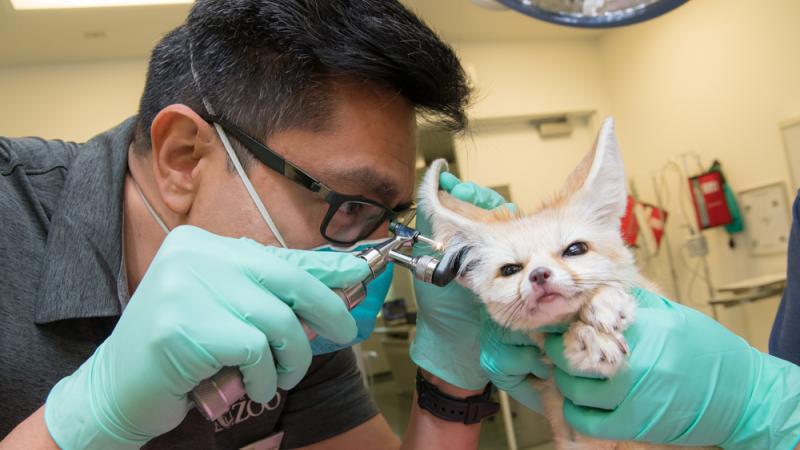Veterinary Preceptorship Program

Section menu
The Oregon Zoo's Veterinary Preceptorship is a six to eight-week opportunity for third or fourth- year veterinary students, currently enrolled in a US veterinary program or students from an American Veterinary Medical Association-accredited college for the academic year of 2022-2023. Students will participate in all facets of the zoo's medicine program, including attending rounds and assisting in the diagnosis and treatment of species in a zoological setting.
Our zoo is home to more than 165 species and subspecies. Our mission is to create a better future for wildlife, with a focus on fighting extinction locally in the Pacific Northwest. The zoo is widely recognized for its commitment to animal welfare, conservation and research. To learn more about the Oregon Zoo, please visit our website.
Oregon Zoo's state-of-the-art Veterinary Medical Center opened in 2012. This 15,000-square-foot building is LEED Gold Certified and includes exam room, surgical suite, radiology room and in- house laboratory and necropsy room. It has all necessary equipment for basic and advanced anesthetic monitoring and diagnostic techniques, including rigid and flexible endoscopy, digital radiography and ultrasound. In addition, the Oregon Zoo Hospital is one of the few in the country that has an on-site CT scan. The zoo's endocrinology lab also offers on-site experience with animal welfare research and welfare-based care.
Oregon Zoo hires a workforce representative of the communities we serve, understanding that a diverse workforce strengthens our organization. We value diversity and support a positive and welcoming environment where all of our employees can thrive.
Essential Job Duties
Goals for the preceptorship:
- Opportunity to observe and actively participate in all aspects of zoological medicine, including; chemical and physical immobilization, clinical and anatomical pathology (post- mortem examinations), surgery, diagnosis and treatment of ongoing clinical cases, overview of the components of a zoo-based preventative medicine program, including quarantine and pre-shipment examinations.
- A chance to collaborate/network with professionals currently working in the field.
Additional experience, knowledge and skills that would make you successful in this internship:
- Communicate clearly both verbally and in writing, including clinical notes and post-mortem reports
- Ability to prioritize and multi-task; must be organized and flexible to change course of work/projects as circumstances dictate.
- Enter data and use specialized software for a variety of tasks. Lift, squat and bend while holding up to 15lbs.
- Grasp, lift and safely hold an object weighing up to 30lbs.
Minimum Requirements
- Preferred: completion of anesthesia, internal medicine and radiology rotations prior to the zoo preceptorship.
- Proof of tuberculosis testing (TB screening) prior to start of internship. Tuberculosis can be transmitted from humans to some zoo animals; therefore, all employees, volunteers and interns who have contact with Zoo animals must be tested annually for TB. Individuals are responsible for ensuring that this requirement is met on an annual basis. Verification is required before position can begin.
This program is offered to third or fourth year veterinary students with a serious interest in medicine. This is an unpaid opportunity. If you are interested in this opportunity, please email the following information/documents to vetpreceptorships@oregonzoo.org:
- One-page letter of intent explaining your long-term career goals and interest in zoological medicine. Include 3 time slots in order of preference in this letter.
- Curriculum vitae or resume
- Two letters of reference
- Veterinary college academic transcript and/or GPA and enrollment status

